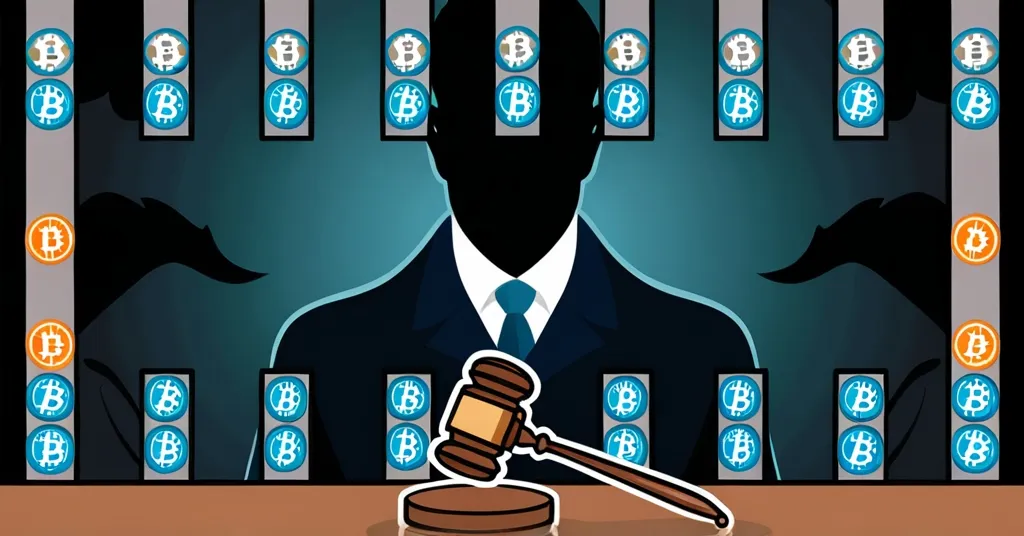Bithumb’s Ex-CEO Jailed for 2 Years in Bribery Scandal: Crypto Corruption Exposed

Former Bithumb CEO Lee Sang-jun Sentenced to Two Years for Bribery in South Korea
Lee Sang-jun, the former CEO of Bithumb, South Korea’s largest cryptocurrency exchange by trading volume, has been sentenced to two years in prison for accepting bribes in a fraudulent token listing scheme. The case involves a complex web of corruption that underscores the risks within the crypto industry and the significant impact of exchange listings on token prices.
- Lee Sang-jun sentenced to two years in prison.
- Bribery scheme involved businessman Kang Jong-hyun and middleman Ahn Sung-hyun.
- Bithumb listings significantly impact token prices.
Bithumb’s role in the South Korean crypto market cannot be overstated. As a leading exchange, its token listings have the power to significantly influence market dynamics and drive up the prices of cryptocurrencies. For instance, when Bithumb lists a new coin, it often signals bullish momentum, as seen with Solana-based cryptocurrencies like PONKE and Raydium, which experienced notable price surges following their listings.
The bribery scandal began when Lee accepted a bribe from businessman Kang Jong-hyun, who paid 3 billion won (about $2 million) in cash and over $272,000 in luxury items to secure a token listing on Bithumb. However, the plot thickened with the involvement of Ahn Sung-hyun, a former professional golfer who acted as a middleman. Ahn is said to have deceived Kang by keeping a large portion of the bribe money intended for Lee, adding another layer of deceit to the scheme.
The Seoul Southern District Court handed down a two-year prison sentence to Lee, along with a 52 million won ($35,367) fine. Kang, the briber, received a one-year and six-month sentence for breach of trust, while Ahn was sentenced to four years and six months for his deceptive actions. These sentences reflect the seriousness with which the court views corruption within the cryptocurrency industry.
This case sheds light on the dark corners of the crypto world, where the promise of a lucrative listing can lead to unethical behavior. Yet, it’s important to recognize that such incidents are not the norm across the industry. While they highlight the need for vigilance and strong regulatory frameworks, they also serve as a reminder that the vast majority of projects and exchanges operate with integrity.
South Korea, a major player in the global crypto market, has responded to these challenges with stringent regulations aimed at curbing fraud and money laundering. The Financial Services Commission (FSC) has introduced measures such as mandating real-name bank accounts for transactions and implementing enhanced due diligence (EDD) to ensure the integrity of financial transactions involving cryptocurrencies. These steps are part of a broader effort to protect investors and maintain market integrity.
Despite the negative aspects highlighted by this case, it’s crucial to maintain an optimistic outlook on the potential of cryptocurrencies and blockchain technology. Bitcoin and other cryptocurrencies continue to disrupt traditional financial systems, offering greater freedom, privacy, and decentralization. The challenge lies in balancing this disruptive potential with the need for effective regulation to prevent abuse and maintain trust.
From a Bitcoin maximalist perspective, incidents like these underscore the value of Bitcoin’s decentralized nature, which inherently reduces the risk of such centralized corruption. However, altcoins and other blockchain projects also play crucial roles in the ecosystem, filling niches that Bitcoin may not serve as effectively. The key is to foster an environment where innovation can thrive while ensuring the integrity of the market.
As advocates of effective accelerationism (e/acc), we believe in the power of technology to drive rapid progress. The crypto industry, despite its challenges, remains at the forefront of this movement, pushing boundaries and challenging the status quo. The Bithumb case is a stark reminder of the work that remains, but it should not overshadow the immense potential for positive change.
Here are the key takeaways and questions:
- What was Lee Sang-jun convicted of?
Lee Sang-jun was convicted of receiving bribes in the form of cash and luxury items to facilitate a fraudulent token listing on Bithumb.
- Who else was involved in the bribery scheme?
Businessman Kang Jong-hyun, who provided the bribes, and former professional golfer Ahn Sung-hyun, who acted as the middleman, were also involved.
- What impact can a coin listing on Bithumb have?
A coin listing on Bithumb can significantly drive up the prices of the listed tokens, as demonstrated by the price surges of PONKE and Raydium after their listings.
- How does this case reflect on the broader cryptocurrency industry?
This case highlights the risks of corruption within the cryptocurrency industry and underscores the importance of regulatory oversight to maintain market integrity and protect investors.
- Why is Bithumb significant in the context of this story?
Bithumb is significant because it is South Korea’s largest crypto exchange by trading volume, and its token listings have a notable impact on cryptocurrency prices.
Navigating the wild west of crypto, stories like these remind us that while the potential for innovation and disruption is immense, the path is fraught with challenges. The balance between decentralization, freedom, and effective regulation remains a critical question for the future of the industry.



